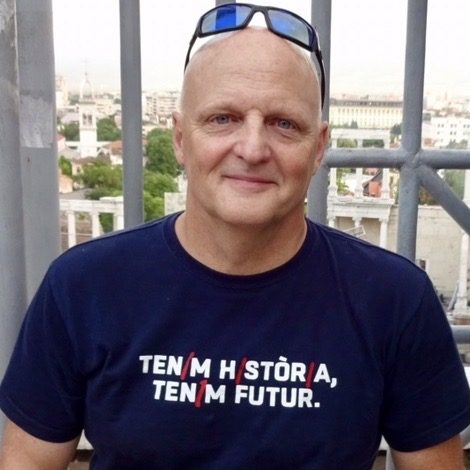Not long ago, I spent a long day in a European capital in the company of a group of young Americans in their 20s and 30s who had been brought together as a result of their elite academic and creative achievements. And as we were condemned to spending the day together as a pack led by our in-country hosts, I had more opportunities than usual to do what I instinctively do as a lover of language and languages: listen in on for clues about how another human cohort, in this case America’s Generation Z, relates to one another and the world at large.
To the best of my knowledge, few if any of these young people had any previous intimate bonds to each other. And yet, in eavesdropped conversation after eavesdropped conversation I heard them talking about what I would consider very personal matters centering more often than not on their own and others’ problematic psychological conditions and dispositions.
This echoed much of what I heard and saw in the last half-decade or so of my career as a professor at an elite private college, and led me to the disturbing conclusion that, at least in a certain class of young people, proudly sharing personal pathologies is fast replacing traditional demonstrations of vigor and life prowess as the prime “currency” of human bonding.
And as anyone who has taken a bit of time to observe animals other than human beings, this is profoundly unnatural.
As much as it pains some people to admit it, human friendship and mating rituals are not all that different from those of other vertebrates. Non-verbal attributes like inviting body language, beauty, perceived physical strength, and perceived fertility have always played a key, if seldom openly talked about, role in forging initial bonds (long-term partnerships being another matter) between people in both potentially sexual and also non-sexual couplings.
In both the human and animal realms, conversely, the parading of personal debilities has seldom been seen as a strong relational currency. And yet, it seems—at least from my admittedly anecdotal observations—that this is fast emerging as a language of attraction among certain groups of young people.
My guess is that for certain adherents of woke progressive culture, what I just suggested is enough to qualify me as an unsalvageable troglodyte. Can’t I see, they would argue, that by being totally open about their vital insufficiencies these young people are, transcending tired old and probably male-imposed ways of thinking and acting that force people to armor themselves with contrived façades of omnipotence when meeting others? With any luck we will in the future leave such false ways of thinking and those that espouse them in the rearview mirror.
That’s a nice thought, but it would seem to hinge on the idea that between the last generation and this one the existential conditions that conspired over thousands of years to favor the development of strength-first friendship and mating languages over those that highlight one’s personal weaknesses and deficiencies have all of a sudden disappeared.
But has the need to be strong in life and/or to be comforted down the road by strong and competent others in certain moments in fact gone away in the last quarter-century? Has the same thing happened with the extremely powerful desire to perpetuate the species? Have we, as the animals and products of millennia of sociobiological programming we are, suddenly ceased searching for verbal and non-verbal representations of such qualities in others? I doubt it.
So how can we explain this emergent cult of weakness in our young?
A number of thoughts come to mind.
Whether we are prepared to admit it or not, we are living through the twilight of the American imperial project and quite possibly, the end of the 500-year dominance of European modernity. And when grand social projects totter, brutality, and fear often become the prime coins of the realm. And this in turn gives weakness and conformity a sheen they lacked in the happier and more expansive days of the culture. So, in that sense it could be argued that these young are adapting rationally to their vital circumstance.
But that, I think, only gets us so far. After all, social projects are always tottering somewhere in the world. And while history shows that the mature and elderly have often responded to such collapses with resignation, the young seldom have. In fact, fueled by their physical vitality and strength they have often reacted with frenzied affirmations of humanity’s most basic and arguably most important drives in such times, setting the stage, in this way, for the dawn of a new age of cultural expansion and optimism.
But that is not what is happening now, at least in the academically high achieving cohort I’ve been observing closely over these last years. Rather, we see frighteningly large outbreaks of uglification, self-mutilation, and self-pathologization in their ranks.
It is often asked if fish know they are wet and are swimming in water. Which brings us back to modernity, and a similar question of my own.
How many of us are aware that we are not “swimming” in the world at large but rather in a version of it refracted through the omnipresent but mostly unstated assumptions of modernity which include, among many other things, that man is the measure of most things, time is linear, the monetization the world’s bounty is inevitable, and that most things worth knowing are apprehended through rational rather than mystical, corporal, or emotional processes?
The frontier between a new guiding social mentality and the one it is said to have supplanted is never as neat or clean as historians make it sound in textbooks. Rather, as it becomes apparently predominant, the new cosmovision will generally need to share space with the remnants of the one it has ostensibly triumphed over for a number of decades, if not centuries.
And so it was in the case of modernity which most historians agree began its ascent to predominance, at least in the upper strata of European culture, at the turn of the 15th and 16th centuries, a time that not coincidentally coincided with the old Continent’s colonial expansion toward Africa, India, and finally the Americas.
But, since its inception it coexisted in many, if not most, social spheres with the previous religion-centered concept of the world. And a strong argument could be made that this remained the case until well into the middle and later years of the 20th century, when secularism became firmly majoritarian in most strata of European and Anglo-American life.
Why is this important?
Because whatever other evil or good that it does, religious thinking impels the human mind to the practice of wonder regarding the immensity of creation along with a recognition of the wonderful, if also fundamentally absurd, accident of being alive.
And such mental exercises inexorably induce a strong measure of humility regarding the ability of a small cadre of humans to rationally manage the lives of their fellow absurd miracles, but also the vastly complex biological, geological, and atmospheric systems of the earth.
Conversely, a culture of pure secularity, of the type that is lived with a marked fervor in our society’s educated classes, tends to cancel the practice of pondering the mind-expanding mysteries of our existence.
In a purely secular world everything is material and life is mostly a matter, not of reverently admiring what has been bequeathed to us on its own terms, but rather how best to manipulate this unfathomable legacy according to our own personal desires and, should these eruptions of our material selfhood not provide clarity, the supposedly clairvoyant “suggestions” of a super-race of “experts.”
What are the results of this regime of extreme hubris?
Put another way, what does modernity—which as I suggested above with my mention of how its birth was coetaneous with that of world-spanning colonialism is, like all social paradigms, a 50-50 mix of dark and light—look like when it manages to finally subdue the countervailing power of wonder?
Just take a look around.
It’s a place where human relationships are not cemented by trust but rather governed by the rules of pure material utility. A place where, as we saw during the pandemic the application of what was, when all is said and done, a relatively small amount of force applied by faceless strangers, people severed long-standing bonds with friends and family.
A place where the most basic human drive—reproduction of the species—is contemplated not mostly in terms of the marvelous and unimaginable surprises and gifts it can bring each of us and the world, but rather how it affects the material status of the very mortal person or persons privileged to participate personally in the mysterious process.
A place where, to bring things full circle, life is increasingly perceived as a place of constantly encroaching crises and threats, in which the most “wise” thing to do is not to do what people have done for millennia—struggle frenetically malgré tout for wholeness, dignity, joy, and meaning—but accept from one’s earliest days that one is congenitally weak, essentially pathological and generally lacking in true agency, and thus better off accepting the dictates of those that are said to know so much more about you than you could ever come to know yourself.
Young people are not responsible for the currently bleak vision of the human condition that so many of them seem to have today, nor for the contemporary zeitgeist regarding the individual’s generalized lack of existential fitness.
We elders are.
But sadly and cruelly, it is their mess to clean up.
And if and when they decide to do so, they were to ask for a suggestion from me, I’d probably say something like this.
The rational and calculating human mind’s ability to deliver something approaching personal contentment to you has been massively oversold during your lifetime. While these modes of cognition can accomplish many wonderful things, they also have a known ability, when the human mind is left exclusively in their care, to create suffocating closed circuits of thought that can lead to a sense of listlessness and despair.
When this happens, build a mental shelf and place this way of thinking on it in hermetically sealed jars and go out into the world in search of wonder.
Published under a Creative Commons Attribution 4.0 International License
For reprints, please set the canonical link back to the original Brownstone Institute Article and Author.



